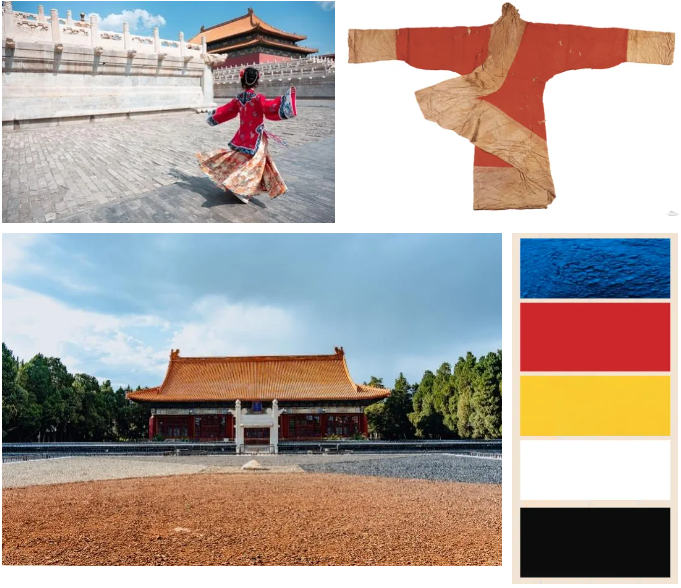 To build a high-quality "dual-competence" teaching faculty for humanities majors in the Open University, and to meet the development requirements of "innovative development", "high-quality" and "integrated collaboration" of the university, on 22 October 2024, the School of Humanities of the Open University of China (OUC) organised a seminar on enhancement teachers' professional competence within its educational system.
To build a high-quality "dual-competence" teaching faculty for humanities majors in the Open University, and to meet the development requirements of "innovative development", "high-quality" and "integrated collaboration" of the university, on 22 October 2024, the School of Humanities of the Open University of China (OUC) organised a seminar on enhancement teachers' professional competence within its educational system.
The theme of the seminar was "Such Colours Await Your Appreciation - on the Colour Culture of Ancient Costumes", and Li Yanhong, an associate professor and master's supervisor in the School of Chinese Language and Literature, University of Chinese Academy of Social Sciences, served as the keynote speaker. The activity was presided over by Han Yi, dean of the School of Humanities of the OUC.

Han Yi introduced the history of the School of Humanities in organising seminars on enhancing teachers' professional competence. She said that the recent series of activities held by the School aimed to focus on the requirement of building "dual-competence " teachers with professional and digital-intelligence abilities proposed by Wang Qiming, Party secretary and president of the OUC, strengthen system-wide linkage and team building, and collaboratively strengthen teachers and shape their souls in an integrated manner to serve the high-quality development of the university.
Li Yanhong said that in ancient Chinese culture, the ancients associated colours with morality, destiny, etc. and applied them to the ritual system, so colours were endowed with cultural connotations beyond their hues. She intertwined the history of social development, the evolution of costume culture, and the profound cultural connotations of colours in a progressive manner, making everyone understand that the two characters "yan" and "se" originally referred to a person's complexion and expression, and later shifted to colours. She elaborated on the differences between "primary colours" and "secondary colours", and comprehensively sorted out the development and evolution of the ritual significance of ancient costume colours with extensive citations. Li Yanhong also analysed the differences in colour cultures between Confucianism and Taoism, enabling everyone to understand the strict ancient costume-colour ritual systems, the origins of common expressions such as " (of a person) extremely popular or highly successful " ("dahong dazi" in Chinese), "right and wrong" ("qinghong zaobai" in Chinese), and "auspicious sign" ("ziqi donglai" in Chinese), as well as the rich colour cultural connotations behind ancient costumes, sacrifices, ritual systems, and architecture.

Li Yanhong focused on the innovation of teaching forms. Implementing General Secretary Xi Jinping's instruction of “letting cultural artifacts play their role in disseminating traditional culture ", she led students to conduct on-site teaching in various museums in Beijing, which coincided with the "immersive teaching" activities explored and carried out throughout the system by the School of Humanities. This lecture integrated multi-disciplinary knowledge such as ancient philology, history, culturology, and aesthetics, cited a large number of ancient documents, was rich in examples and detailed in arguments, and was meticulous and vivid in explanation, enabling teachers in the system to not only understand in-depth professional knowledge but also feel the extensive and profound nature of excellent traditional Chinese culture, further enhancing the national pride and cultural self-confidence of the participating teachers.
Wang Haiping, an associate professor in the Chinese Department of the School of Humanities, summarised the questions raised by teachers participating online and offline, and interacted and communicated with Li Yanhong on phenomena such as misunderstandings and misuses of ancient costume colours in daily life. Han Yi, on behalf of the School, thanked Li Yanhong for her wonderful sharing and proposed that humanities-major teachers should keep pace with the times, understand the development and evolution of colour connotations in Chinese traditional culture in the current era, and scientifically explain and objectively apply them in teaching.
All teachers in the School of Humanities and humanities-major teachers in the OUC educational system participated in the seminar through a combination of online and offline methods. Members of the Literature, History, Philosophy and Arts Sub-committee of the OUC Academic Committee observed and guided online.
Written by Wang Haiping, photo by Zhang Qian